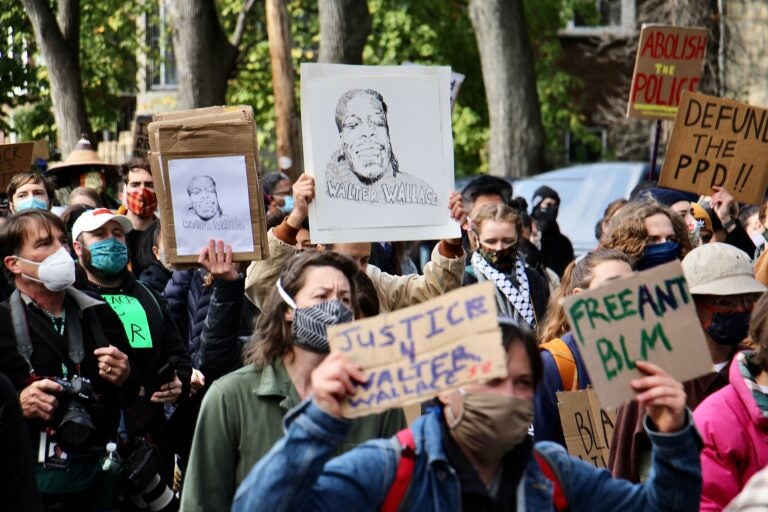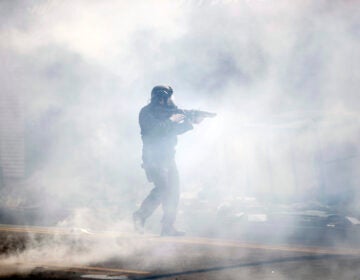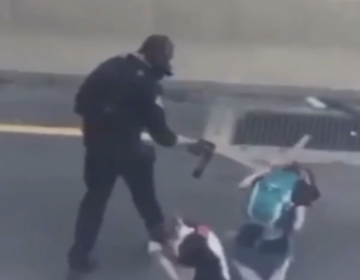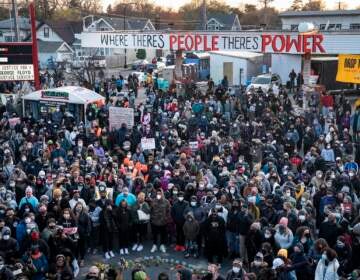Legal observers sue Philly police alleging brutality at protest of officer shooting of Walter Wallace Jr.
The suit seeks punitive and compensatory damages, and is the latest in a slew of police brutality cases brought against the Philadelphia Police Department.

Protesters march from the scene of Walter Wallace Jr.’s killing to Malcolm X Park in Oct. 2020. (Emma Lee/WHYY)
A Philadelphia historian and legal observer has filed a lawsuit alleging instances of police brutality during protests following the deadly shooting of Walter Wallace Jr. by city police in October.
The suit, filed Jan. 21, seeks punitive and compensatory damages, and is the latest in a slew of police brutality cases brought against the Philadelphia Police Department and the City of Philadelphia in the aftermath of a summer and fall marked by unrest.
Historian Anne Berg, alongside fellow plaintiffs Catherine Heite and Bridget Biddle, claim they were physically assaulted and mistreated by PPD officers while attending demonstrations that took place on Oct. 26 and 27, 2020 following the killing of Wallace, a West Philadelphia man who was experiencing a mental health crisis when he was shot by an officer.
Both Berg and Heite were acting as legal observers at the demonstration, tasked with watching and recording the event to ensure protesters are granted their First Amendment rights to peacefully assemble and wearing apparel that was clearly marked “LEGAL OBSERVER,” when they were attacked without cause or justification, the lawsuit says. Biddle was peaceably participating in the demonstration when she was targeted without cause or justification. According to the lawsuit, all three plaintiffs aim not only to vindicate the violation of their rights, but to prevent the PPD from committing such violations in the future.
“Usually, the question that I get when I’ve told people that I was assaulted by a police officer is ‘what were you doing?’” Berg, who said she was taking notes at the time, said. “The implied assumption is always that somehow, there must be an infraction for police to act the way that they do, that there must be something that brought on the wrath of the state.”
The Walter Wallace Jr. protests were not Berg’s first time encountering the PPD. The University of Pennsylvania professor protested in demonstrations on May 30 following the murder of George Floyd. She watched at a distance on May 31 when Philadelphia Police responded to protest and instances of looting on 52nd Street with tear gas and aggressive force.
An op-ed Berg wrote, chronicling the series of events that unfolded that day, highlights what she labeled an ongoing history of “over-policing, Penntrification, and criminalization of West Philly’s Black community.” Berg said the May events were very similar to those that took place in October.
Following the protests against police brutality that took place in May and June, the city of Philadelphia commissioned a review assessing the PPD’s response to demonstrations and civil unrest and found that both the city and the police were insufficiently prepared and that there were shortcomings in use-of-force policies. An independent investigation into the use of tear gas released Wednesday by Philadelphia Controller Rebecca Rhynhart found multiple leadership and planning failures leading up to the use of tear gas on 52nd Street.
For Berg, the police force’s efforts to maintain control is something that historians can trace back to their origin as slave patrols, in which their purpose was to protect property — a key topic in a class she teaches at Penn on the history of policing in the modern world.
Paul Messing, a civil rights lawyer representing the plaintiffs, stressed that the purpose of the lawsuit is primarily to prevent future incidents like the assaults against the plaintiffs from happening to other protesters.
“These kinds of lawsuits are designed both to vindicate the violations of the rights of the plaintiffs — in this case, Ms. Berg, Heite, and Biddle — but also, and very importantly to the plaintiffs, to try to convince the city and the police department to take steps so that these kinds of incidents do not recur,” he said.
He said legal observers play a vital role in protecting civil liberties during moments of public protest and unrest.
“Certainly in terms of legal observers, there can be no excuse for the use of force, or the abuse of police powers directed on legal observers, or members of the media, or all those who are at the time of these demonstrations there for the purpose of making an independent observation of what’s going on,” Messing said.
Spokespeople from the City of Philadelphia and the PPD said they cannot comment on pending litigation.
Messing said he and his law firm have been involved in similar civil rights cases for years, and while there has been some success, it takes time for substantive change to be made.
“While there’s been significant improvements, both in a reduction in the number of pedestrian stops and a reduction in the number of bad stops — stops made without legal cause — it’s still a problem, and every year, thousands upon thousands of people in Philadelphia, primarily people of color, are still being stopped and frisked and detained without any justification, and the racial disparity is especially galling and unacceptable,” he said.

Subscribe to PlanPhilly
WHYY is your source for fact-based, in-depth journalism and information. As a nonprofit organization, we rely on financial support from readers like you. Please give today.








